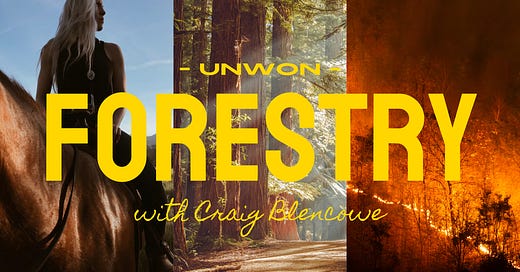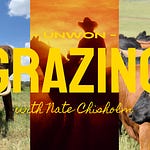It was a real honor to speak with private forestry consultant Craig Blencowe, a leader in sustainable forest management. I asked Craig about timberland management, fire prevention, what’s changed in the American timber industry, spotted owls, bark beetles, what has gone wrong at the U.S. Forest Service, why we stopped salvaging lumber on public land after wildfires and hurricanes, why lumber is less dense than it used to be, what he means by a multi-use approach to public land, why he prioritizes the well-being of rural communities in his practice, and much more.
Craig is based in Mendocino County, California. He graduated from Stanford University with a degree in biological sciences and worked for the National Park Service before beginning his private practice. Craig was the first SmartWood-certified resource manager and in 2024 received the California Licensed Forests Association Award for Outstanding Forester.
Let me know your thoughts in the comments!
UNWON exists to tell the stories of the people who build, feed, and protect this nation. Keely Brazil Covello is a Western writer, journalist, and filmmaker. Learn more and subscribe at www.americaunwon.com.












Amazing episode, thanks for putting this together with Craig!
Viewing and listening in from the Missouri Ozarks. Formerly from Southern California (the San Fernando Valley), I was quite fascinated with your Craig Blencowe interview. He REALLY talks good sense and stewardship. Thanks for taking responsibility in these areas.
Thanks for the comment Norm, I'm glad you enjoyed the interview. I learned so much from Craig. He is a wealth of knowledge!
HI Keely, I agree with much of what has been discussed but the primary point that we are dealing with an ecological environment where the keystone species have a 400+ year lifecycle and we are trying to recreate this in around 100 years is a key issue. Coupled to this is the recent past interactions of more intensive fire by the indigenous and then more intensive logging due to settlement has thrown the whole system into disarray. Very difficult to find an ecological solution in all this and even if we allow for a movement toward ecological equilibrium will this be possible within a warming world. We have a lot to learn and understanding may need to include a look into the processes of evolution that created the system in the first place, and humans as a catalyst to recreate them for greater sustainability of the system as a whole. Many thanks
An example , we recycle cardboard up to 7 times before it becomes a waste product could we then turn this waste into compressed fiber logs as every logging truck returns empty could we catalyze a system if they turned up with compressed fiber logs covered in moss and the like? A forest needs to be whole to function efficiently take away one critical element and the whole slowly unravels as we are currently witnessing.